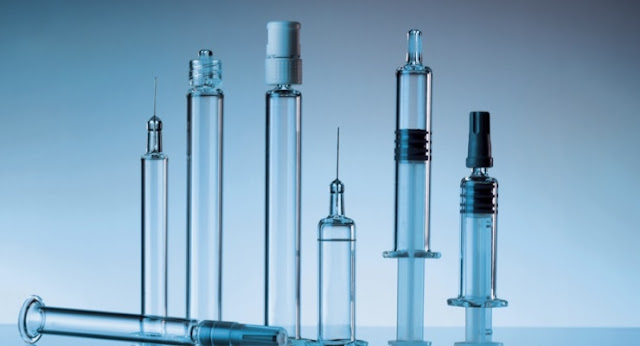The Rise Of Prefilled Syringes Syringe Body Already Filled With A Specific Dose Of A Drug
 |
| Prefilled Syringes |
The pharmaceutical industry has seen tremendous growth and innovation in drug delivery systems over the past few decades. One area that has experienced significant advancement is prefilled syringes. Once seen as a niche product, prefilled syringes are now widely used for injecting many different types of drugs. This article discusses the advantages of prefilled syringes and why their use is on the rise.
What are Prefilled Syringes?
A prefilled syringe consists of a syringe body already filled with a specific
dose of a drug. The syringe body has a plunger and a needle or luer lock tip
attached. Prefilled syringes provide a sterile, single-use delivery system that
is ready to administer without having to fill or assemble at the point of use.
This convenience makes prefilled syringes appealing for both healthcare
providers and patients. Prefilled syringes come in various sizes depending on
the dose and volume of drug they contain. Common sizes range from 1 ml to 3 ml.
Benefits of Prefilled Syringes
Ease of Use and Accuracy: One of the key advantages of prefilled syringes is
that they are already assembled and filled, eliminating the possibility of
dosing errors that can occur during manual filling andassembly. Healthcare
providers can quickly and accurately administer the precise dose without having
to draw up medication from a vial or ampoule. This improves efficiency during
medical procedures.
Improve Patient Compliance: For treatments that require self-administration,
prefilled syringes make it easier for patients. The single-use, pre-assembled
format simplifies the injection process and discourages using partially emptied
syringes multiple times which can compromise sterility. This boosts medication
adherence especially for long-term therapies.
Enhanced Sterility: Prefilled
Syringes provide a barrier against contamination since they maintain
sterility from the point of fill all through administration without exposure to
ambient air. This is crucial for drugs that are sensitive to microbiological
contamination. It also gives patients peace of mind.
Cost Savings: Though the initial manufacturing cost of prefilled syringes may
be higher, they result in reduced resources and wastage compared to manually
filled syringes. Not having to draw doses from vials saves drug product and
leads to fewer unused or partially emptied containers. Less overfill is also
required for batch consistency purposes. These factors offer cost advantages
over the long term use of a product.
Growing Number of Biologics: The rise of complex biologic drugs and dosage
forms requiring parenteral delivery has fueled the need for prefilled syringes.
Many biologics have short shelf lives or stability concerns when exposed to
oxygen and must be packaged and delivered in a way that maintains their
integrity. Prefilled syringes meet this need perfectly.
Prefilled Syringes in Specialty Therapies
The versatility of prefilled syringes has led to their widespread adoption
across various medical fields. Some major therapy areas where prefilled
syringes have gained prominence include:
Self-injectable Drug-Device Combos: Combination products comprising an
auto-injector or pen injector with a prefilled syringe have transformed
self-care for chronic diseases like diabetes, rheumatoid arthritis, and
multiple sclerosis. The most prominent examples are insulin pens and
auto-injectors for epinephrine or migraine therapies.
Vaccines: Vaccines need reliable cold chain management to maintain potency and
safety. Prefilled syringes allow vaccines like influenza to be directly
delivered from cooled transport to administration without opening vaccine vials
and risking contamination or dose errors. This is important both for seasonal
flu shots and mass immunization during pandemics.
Biologics: As the biologics revolution continues, prefilled syringes have
emerged as the standard packaging for large molecule drugs. Examples include
prefilled syringes of monoclonal antibodies used for cancer, autoimmune
diseases, and other conditions requiring intramuscular or intravenous
injections.
Aesthetic Medicine: The non-surgical cosmetic medicine field heavily relies on
prefilled syringes of botulinum toxin and dermal fillers. The precise,
reproducible dosing facilitated by prefilled syringes is essential for
treatments requiring injection of minute volumes.
Future Outlook
It is estimated that the global demand for prefilled syringes will increase exponentially
driven by these specialty therapeutic areas. Industry experts forecast the
market to exhibit growth rates well above 10% annually through 2025. Regulatory
standards supporting prefilled syringes and technological advancements to
enhance user-friendliness will boost acceptance further. Cost reductions
achieved through automation and streamlined manufacturing should make prefilled
syringes widely affordable. Their clear advantages over traditional vial and
syringe packaging signify prefilled syringes will remain the preferred delivery
format for injectable biologics and vaccines well into the future.
In summary, prefilled syringes have emerged as a technology that improves
medication safety, efficacy and efficiency. Their rise addresses the evolving
needs of the pharmaceutical sector and patients. As drug development continues
apace with more personalized therapies, prefilled syringes are poised to play
an even greater role.
Get
more insights, On Prefilled
Syringes



Comments
Post a Comment